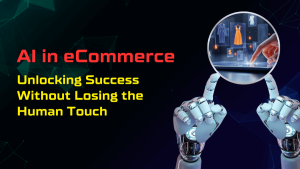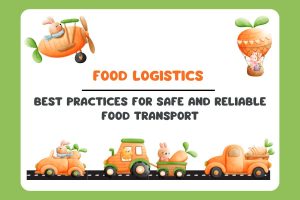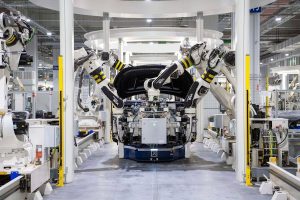Top 5 Benefits of Integrating AI into Logistics & Transportation

Artificial intelligence (AI) is progressively transforming the modern business world and will keep on doing so in the coming future. According to Statista report, the global market size of AI is expected to grow by $126 billion by 2025.
AI-driven technologies help businesses automate repetitive and rule-based tasks. Thus, it allows organizations to focus on more essential tasks, resulting in improved efficiency, streamlined operations, enhanced productivity, saved resources, and reduced costs. It is why businesses across industries are increasingly embracing the power of AI, and the logistics and transportation industry is no exception to it.
By harnessing the power of the logistics and transportation software development services of AI, businesses can enjoy a plethora of benefits ranging from workhouse and inventory management to customer support and automation of processes. Let’s take a look at the top five benefits of integrating AI technologies in the logistics and transportation industry.
AI Advantages in the Logistics and Transportation Industry
With the continued advancements in AI technologies, the logistics and transportation industry is witnessing a significant transformation. The role of AI in the logistics and transportation market is estimated to extend $20 billion by 2028. AI in the sector is revolutionizing the way organizations operate by offering a range of benefits. Here are the top five benefits of integrating AI in the logistics and transportation industry:
Route Optimization
Route optimization is one of the most remarkable benefits of integrating AI in the transportation sector. AI-powered solutions help logistic managers ensure timely and safe deliveries of goods, reducing shipping and transportation costs. Finding the most efficient route involves analyzing vast troves of data, and AI algorithms can do it instantly, leading to optimized planning and execution.
The integration of AI technologies in the logistics and transportation sector helps businesses discover the most efficient routes while gaining a competitive edge and saving costs along the way. By optimizing the routes, companies can reduce fuel consumption, and operational costs, resulting in improved efficiency and overall savings in the transportation industry.
Predictive Maintenance
Predictive fleet maintenance is another remarkable benefit of integrating AI in the logistics and transportation sector. AI-driven solutions help businesses identify any underlying issues and take a preventive approach rather than reactive actions.
AI solutions analyze fleets on multiple factors like vehicle performance, historical data, maintenance time, etc., while predicting maintenance needs or potential failures before they occur. It helps fleet managers make data-driven decisions and prevent costly breakdowns, resulting in improved efficiency, increased asset utilization, enhanced safety, and reduced maintenance cost.
Inventory and Warehouse Management
AI-driven solutions can effectively optimize inventory and warehouse management by analyzing customer behavior, market trends, demand patterns, and historical data. Warehouse robots integrated with AI can perform repetitive and routine tasks more efficiently and accurately, helping organizations optimize inventory levels and avoid stockouts.
AI in the warehouse and inventory management identifies seasonal demands and ensures that all the products are available in the inventory to meet the market trend and consumer demand, reducing inventory-related expenses and improving customer satisfaction.
Reduce Operational Costs
The implementation of AI in the logistics and transportation industry also helps lowers costs in various ways. By forecasting demand, automating workflows, streamlining operations, identifying fleet maintenance needs, and optimizing routes, companies can significantly save resources and stay safe from costly errors. Therefore, saving a big portion of operational costs, including maintenance costs, production costs, marketing costs, salaries, and so on.
Autonomous Vehicles and Delivery Drones
AI is a game-changer in the logistics and transportation industry, particularly when it comes to realizing the vision of driverless vehicles and delivery drones. By leveraging the full potential of artificial intelligence, transportation companies like BMW, Waymo, Tesla, etc., develop self-driving trucks, driverless cars, and delivery drones. These autonomous vehicles facilitate last-minute delivery processes, enhancing speed, improving accuracy, and reducing labor costs.
Autonomous vehicles zooming around on the road not only lead to safer transportation but also optimize energy consumption and minimize carbon emissions, reducing our environmental impact. The advancements brought by autonomous vehicles in the logistics and transportation industry can truly transform the operational landscape, shaping a more efficient and sustainable future.
Final Thoughts
AI integration in the logistics and transportation industry is still in its initial stages, only showing a glimpse of its capabilities. In the coming years, the advancement and implementation of AI are expected to take a greater boom, eventually doing more duties and taking businesses to unprecedented heights.
By automating repetitive and rule-based tasks across verticals, AI can streamline operations, eliminate human errors, and predict upcoming trends, thus gaining competitive advantages and sustainable growth. So, if you truly wish to stay ahead in today’s digital landscape, it is the right time to level up your AI game. AI technologies can give logistics and transportation companies a competitive edge in today’s ever-evolving digital landscape.






